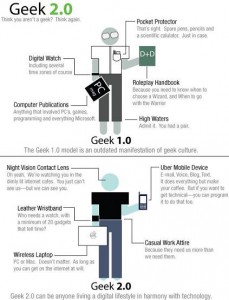Welcome to this week’s Language Blog Roundup, in which we bring you the highlights from our favorite language blogs and the latest in word news and culture.
In word of the year news, Dictionary.com’s selection for 2013 is privacy; Geoff Nunberg, like Oxford Dictionaries, is going with selfie; and Collins Dictionary has chosen geek. Curious about the origin of geek, dork, and other nerdy words? Check out this post from io9.
Meanwhile twerk is the word TIME readers most want banished from the English language, and bitcoin is the Australian National Dictionary Centre’s wordy pick of the year. And where there’s bitcoin, there are bitcoinaires, as spotted and explained by Barry Popik.
In other language news, in Norway all library books must be digitized by law; a Jane Austen portrait sold for almost 165,000 pounds; and New York Times book reviewer, Michiko Kakutani offered her 10 favorite books of the year.
This week we learned the origin of the word hipster; how to tell statements from questions in Valley Girl talk; and what the heck “the Desolation of Smaug” means. At The Atlantic Megan Garber wondered if delightful is the new cool, Deborah Fallows taught us the language of the skies, and, as reported by the CBC, we discovered that the L’Académie française decided that sexting in French is not sextos but textopornographie.
Ben Zimmer traced the history of the phrase embrace the suck, recently uttered by Nancy Pelosi. Arika Okrent gave us eight beautiful snow scenes from literature and 11 proclitic words such as ‘tis, ‘twas, and ‘twere. Grammar Girl explained why we call people redheads and not orangeheads.
From the OUP blog is a post on the different shades of gray and grey, and from OxfordWords Blog, the lasting impression of fictional titles. From Barry Popik we got the story behind the phrase Wolf of Wall Street.
In words of the week, Fritinancy selected scrumpy, “rough cider made from dried or withered apples,” and affluenza, “a painful, contagious, socially transmitted condition of overload, debt, anxiety and waste resulting from the dogged pursuit of more.”
The Word Spy spotted attention theft, “the intrusion on a person’s attention by unwanted and unauthorized text, sounds, or images”; participatory Panopticon, “an all-encompassing system of surveillance created by the people being watched through their use of mobile technologies and trackable transactions”; and gift creep, “a gradual increase in the value or extent of one‘s gift-giving.”
The Dialect Blog looked at the changing meaning of nauseous; the “sickness” accent; and young New Zealand English.
Peter Leonard wrote a tender obituary for his father, Elmore. The New Yorker told us about David Foster Wallace’s favorite grammarian and recapped this year’s literary feuds. Maria Popova told us about authors’ sleeping habits versus their literary productivity.
This week we also learned about the origins of the word sheeple and how to talk like a real-life line cook. We loved this round-up of (some NSFW) band names, these Japanese love hotel names that could be band names, and these 20 famous authors as dolls (Ernest Hemingway action figure? yes please!).
Tired of selfies? You’re in luck: now there’s the shelfie.
Don’t feel like working? You’re in luck again. Check out this OED birthday word generator and find out which words originated the year of your birth.
That’s it for this week! Until next time, happy holidays!
(Photo: CC BY 2.0 by LuChOeDu]

